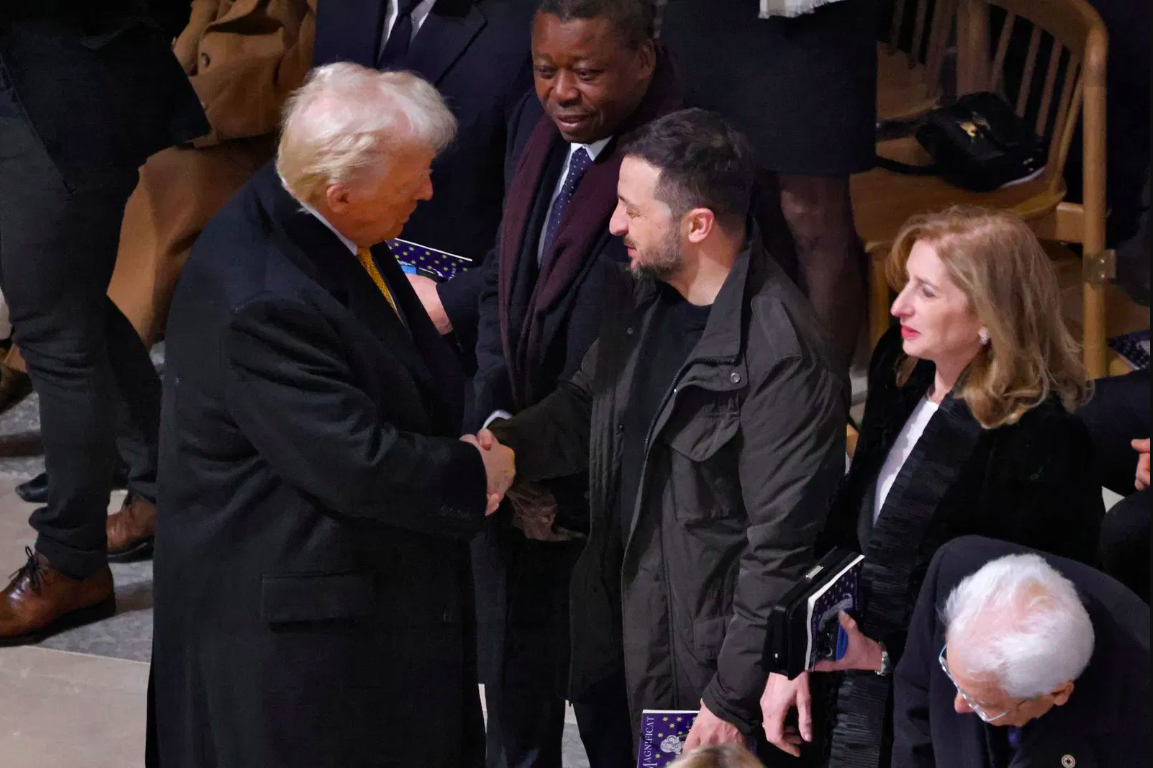
Published 12/09/2024 16:56 | Edited 12/09/2024 17:30
In his first interview after being elected, Donald Trump outlined a political program marked by forceful statements and radical promises. The interview with NBC News’ “Meet the Press” program highlighted the future government’s priorities, including tensions with NATO, changes in immigration policies and reviews of aid to Ukraine.
“Pay to stay”: The relationship with NATO
Trump again criticized his North Atlantic Treaty Organization (NATO) allies, insisting that the United States could leave the alliance if other countries did not increase their financial contributions. “If they pay their bills and treat us fairly, we will stay,” he declared. This rhetoric reflects the former president’s long-standing skepticism about the U.S. role in NATO, with a focus on a more equitable cost-sharing model.
Experts interpret the stance as a strategy to pressure European countries, particularly those with less defense investment, while increasing concerns about the geopolitical impact of a possible US withdrawal from the military pact.
Trump has for years criticized NATO for, in his view, burdening the US with disproportionate costs while European countries and Canada fail to meet their military spending targets. The alliance requires each member to invest at least 2% of its Gross Domestic Product (GDP) in defense, a target that many countries did not reach during its first term.
However, the landscape has changed since then. Russia’s invasion of Ukraine provoked a strategic realignment in Europe. Under the leadership of Joe Biden, NATO expanded its efforts, with the historic entry of Finland and Sweden into the bloc and a significant increase in defense investments. In 2023, eleven countries met the 2% target, and 23 are expected to reach this milestone by 2024.
Implications of a possible exit
The possibility of a US break with NATO raises deep concerns about the stability of transatlantic security or the hegemony of the US and Europe over the rest of the world. The alliance has been essential to sustaining aggression, particularly in the Middle East and Africa, and has played a critical role in responding to the conflict in Ukraine.
Ian Kelly, a former State Department diplomat, warns that a US withdrawal would leave Europe more vulnerable to Russian expansion and generate economic and political instability. “That would cause chaos,” he said, although there is no Russian interest in territorial expansion. Putin claims to be merely defending himself from the expansion of NATO bases on his borders.
Furthermore, NATO plays a fundamental role in America’s own security interests. The only time that Article 5, which establishes collective defense, was invoked was after the September 11 attacks, demonstrating the interdependence between American and European security.
Reduced support for Ukraine
Trump indicated that Ukraine should “probably” expect less military aid from the United States under his watch. This statement signals a departure from the Biden administration’s policy, which prioritized supporting Ukraine’s defense against the Russian invasion. The position reinforces a more isolationist foreign policy strategy, focused on reducing US involvement in international conflicts.
Despite this, Trump stated that he was committed to seeking a diplomatic solution to the war, highlighting that efforts in this direction will be a priority during his term.
Trump’s strategy: bargain or rupture?
Trump’s defenders argue that his threats to NATO never materialized into formal actions and that they are a bargaining strategy to force allies to increase their defense investments. During his previous term, Trump made progress in this regard, pressuring alliance members to contribute more than $430 billion additionally.
However, critics highlight the risks that this approach weakens NATO’s cohesion and amplifies tensions between members, especially at a time of strategic realignment caused by the war in Ukraine.
As Trump holds meetings with global leaders, including NATO Secretary-General Mark Rutte and Ukrainian President Volodymyr Zelenskyy, he seeks to cement his vision for a narrower U.S. role on the international stage. However, the next few months will be crucial to define whether his threats will materialize or whether they will merely serve as leverage to strengthen the American position within the alliance.
For analysts, Trump’s stance reflects a dilemma between pragmatism and idealism: balancing domestic economic interests with the global responsibilities of a superpower. His administration will face significant pressure from allies and opponents to decide the future of the American presence in NATO and its relationship with transatlantic security.
Dramatic changes in immigration and criminal justice
Domestically, the president-elect promised to tighten immigration policies, including the mass deportation of undocumented immigrants and the elimination of birthright citizenship, protected by the 14th Amendment to the US Constitution. “It will be difficult, costly, but necessary,” declared Trump, emphasizing the fight against crime as a justification.
Furthermore, the future president announced that, on his first day in office, he will grant pardons to those involved in the attack on the Capitol on January 6, 2021. He criticized the treatment given to detained protesters, classifying it as “excessively harsh”.
Economy: tariffs, minimum wage and abortion
In the economy, Trump reiterated his intention to increase import tariffs on products from trading partners, but admitted that such a measure could impact American consumers. “I can’t guarantee that families won’t pay more,” he said.
He also promised to evaluate an increase in the federal minimum wage, conditional on discussions with state governors, reflecting caution about the economic implications of the measure.
On abortion, Trump has taken a decentralized approach, indicating he will leave the issue to state lawmakers to decide, including the regulation of abortion pills.
Reaction and political scenario
Trump’s statements divide opinions. His supporters see the pledges as a continuation of his “America First” platform, while critics warn of the risks of international isolation and erosion of civil rights.
The president-elect’s firm stance, combined with a strengthened support base, suggests that his next term could bring profound changes, both in the United States and on the global stage. Analysts predict heated debates over immigration, national security and the U.S. role in an increasingly polarized world order.
Source: vermelho.org.br

